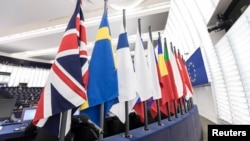British and European businesses are sounding increasingly urgent warnings about the economic damage the U.K.'s exit from the European Union could cause, as the U.K.'s two biggest political parties acknowledged Wednesday that they remain deeply divided over post-Brexit trade and customs arrangements.
Britain is due to leave the EU on March 29, 2019, and the bloc is frustrated with what it sees as a lack of firm proposals from the U.K about future relations.
Prime Minister Theresa May declined to say Wednesday when the government would publish a promised document setting out its negotiating position.
May's Conservative government is split between ministers who favor a clean-break "hard Brexit" — leaving Britain freer to strike new trade deals around the world — and those who want to keep closely aligned to the EU, Britain's biggest trading partner.
"We have a Cabinet that is completely and totally divided so there is no plan for what the negotiating position is going to be," pro-EU Conservative lawmaker Anna Soubry said. "You may think that is a pretty shabby and shocking state of affairs. That is the reality."
Labor Party Brexit spokesman Keir Starmer acknowledged that "there are very divided views" among the opposition party's lawmakers over whether Britain should try to remain in the EU's single market.
"I wish I could report complete unity," Starmer told the BBC. "But we are not in that position."
Some Labor lawmakers want Britain to stay in the single market to minimize disruption to the U.K. economy after Brexit.
Party leader Jeremy Corbyn is calling instead for the U.K. to have "full access" to the single market. Critics say that is vague, and EU leaders have repeatedly said Britain can't have the benefits of membership without the responsibilities.
More wrangling is guaranteed when the government's key piece of Brexit legislation returns to the House of Commons next week.Parliament's upper chamber, the House of Lords, has inserted amendments to soften the terms of departure and keep the U.K. economy closely aligned with the bloc's.
The government has vowed to overturn the amendments. But pro-EU legislators from both the Conservative and Labor parties say they will push for the U.K. to remain inside the single market by joining the European Economic Area, a grouping of the EU plus Norway, Iceland and Lichtenstein. May and Corbyn have both rejected the idea.
Amid the indecision, British and European businesses say uncertainty is hurting and they urgently need to know what future trade arrangements will be.
The Dutch government is warning businesses that Dutch products made using British parts and exported outside the EU could fall outside free trade agreements Europe has made with other parts of the world, and therefore be subject to tariffs. That's bad news for U.K. companies in the auto industry, where it's common for cars to be assembled in one country using parts from others.
John Neill, chief executive of car-components firm Unipart, said "lots of jobs" could be lost if Britain was shut out of the EU's existing free-trade deals.
He told the BBC that "big global component manufacturers ... are worried about investing in the U.K. because they feel there is so much uncertainty."
Transport firms also sought certainty. James Hookham, deputy chief executive of Britain's Freight Transport Association, said "the industry's frustration with the lack of progress is building daily."
"Logistics businesses simply cannot answer their customers' questions about how they will move goods after Brexit," he said. "Manufacturers and retailers are losing faith and fear that post-Brexit Britain is at real risk of becoming nothing more than a series of roadblocks at our ports and airports."
Benoit Rochet, deputy chief executive officer at the Port of Calais, told British lawmakers on Tuesday: "We know that there is Brexit, but we don't exactly know what Brexit means."




